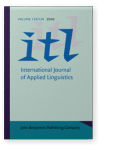Vol. 135/136 (2002) ► pp.85–96
Vol. 135/136 (2002) ► pp.85–96
Lexical Signatures in Foreign Language Free-Form Texts
Abstract This paper presents an investigation into the extent to which the lexical choices made by learners of a second language (L2) are distinctive. It follows on from an earlier paper by the same authors in which a neural network was successfully trained to mark a set of texts produced by L2 learners to the same standard, within broad categories, as had been awarded by experienced human markers. For this present paper, we examined a set of L2 texts and searched them for unique lexical choices (‘lexical signatures’). The results suggest a possible explanation for the success of the neural-network trial, and may have some practical implications for determining the levels of achievement reached by L2 learners.
Cited by (1)
Cited by 1 other publications
This list is based on CrossRef data as of 4 july 2024. Please note that it may not be complete. Sources presented here have been supplied by the respective publishers. Any errors therein should be reported to them.
